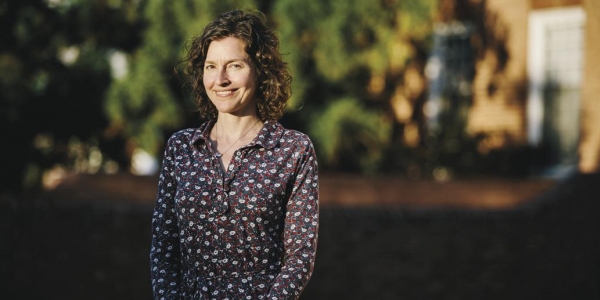
Lexey Swall for The Chronicle
Colleen R. O'Neal, assistant professor of psychology at the U. of Maryland, studied refugee students in Malaysia on a Fulbright in 2010. "You're introduced to new topics that you never would have dreamed of," she says.
By Ian Wilhelm
Colleen R. O'Neal had what many might call the quintessential Fulbright experience.
For years, Ms. O'Neal, who earned her Ph.D. in clinical psychology, had studied the emotional health of minority students under duress in the United States. But in 2010 she traveled to Kuala Lumpur, Malaysia, as part of the U.S. State Department's Fulbright Program.
There she discovered a new passion: studying the stresses faced by the 40,000 or so refugee children from Burma and elsewhere—an underserved population she says she had never heard of before she arrived.
When the fellowship ended, Ms. O'Neal was determined to continue working with the refugees, and even left her position at New York University's School of Medicine to take a new job at a program more open to international research and teaching.
Today, Ms. O'Neal, an assistant professor at the University of Maryland at College Park's College of Education, credits the Fulbright with altering the trajectory of her academic life.
"One of the amazing things about Fulbright is that you're introduced to new topics that you never would have dreamed of in your research," she says. "I fall into that category."
Ms. O'Neal is not alone. Of the roughly 1,100 American scholars who go abroad each year as part of the program, many say it has a lasting impact on their careers, says Meghann Curtis, deputy assistant secretary for academic programs at the State Department's Bureau of Educational and Cultural Affairs, which oversees the Fulbright Program.
She says she and other department officials often hear academics say the program "changed the way I do my research, it changed the focus of my scholarly research."
In recent years the State Department has started new efforts to help the 325,000 alumni around the world maintain their international links and use the Fulbright experience to improve their job prospects.
While the department's main focus will remain on making the fellowship itself as rich an experience as possible, "there's going to be more and more things that we start to engage in to help Fulbrighters to continue to develop their careers and to stay connected," says Ms. Curtis.
The department opened an alumni office for Fulbright and its other academic programs 10 years ago. Part of its focus has been on gaining a better understanding of the international exchanges' long-term benefits.
According to a 2009 survey, the most recent available, commissioned by the State Department of 520 American scholars who had been on a fellowship three to four years earlier, more than 50 percent said the Fulbright contributed in part to positive career changes, which in some cases included being promoted and earning tenure.
The survey also suggested that the program had a lasting influence on the participants' teaching and research. More than 80 percent said they had incorporated international content in their coursework as a result of the fellowship, about 75 percent said they had continued collaborating with former colleagues in their host country, and almost 60 percent said they had already returned to the country for professional purposes.
To help continue such connections, the State Department has started holding conferences for alumni in specific areas of research; a forthcoming meeting in Sweden, for example, will bring together former Fulbright scholars to discuss how climate change is affecting the Arctic. Ms. Curtis says the department also plans to help American alumni continue their language studies and to hold job fairs overseas for foreign Fulbright scholars.
Perhaps the most significant effort was the establishment of an "innovation fund" three years ago. It provides small grants to alumni of the Fulbright and other U.S. government exchange programs to start or continue projects overseas. Last year it awarded $1-million to such efforts. (The State Department said it was unsure how much would be available for the fund this year.)
One of the 2012 recipients was a team of former Fulbright scholars led by Ms. O'Neal and Wai Sheng Ng, a Malaysian academic who earned a Fulbright in 2001. The group received $25,000 to continue its work with refugee students in Malay society.
While the dollar amount is small by American standards, it will go a long way in the developing world, says Ms. O'Neal. It will be used to train teachers in how to assess and manage the mental-health needs of refugee students. Barred by the government from attending public schools, refugee children instead enroll in education programs operated by nongovernmental organizations and religious groups that rely on volunteer instructors.
Ms. O'Neal says she plans to return to Malaysia as often as her responsibilities at home allow. Regardless, she says her academic work will continue to have a global bent.
Meeting the refugee children exposed her to how national policies that drive people to flee their homelands can have a distinct impact on the welfare of individual students. "It expanded my research to how the political is personal."
No comments:
Post a Comment